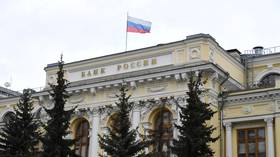US sanctions against Moscow are a ‘persistent risk' but national reserves can withstand everything, says Russian Central Bank head

The threat of more sanctions hanging over Moscow is a “persistent risk” for Russia, but the country has increased its cash reserves and changed its banking policy to keep any potential dangers from economic measures under control.
This is according to Elvira Nabiullina, the governor of Russia's central bank.
“That’s why our monetary policy, as well as fiscal policy and whole macroeconomic policy, is quite conservative,” she told American broadcaster CNBC, noting that Russia has reserves big enough “to withstand all financial scenarios or geopolitical scenarios.”
Russia has come under a barrage of sanctions from Washington since 2014, and the country has been forced to manage its economy in a way that keeps it secure against any possible future measures. This year, Moscow has been placed under more restrictions after allegations that it interfered in US elections and ordered the poisoning of Western-backed opposition figure Alexey Navalny.
One way to battle against sanctions is to keep a lot of money in reserve, Nabiullina said, noting that Russia's financial cushion is very diversified and that “de-dollarization” is part of a broad policy to manage foreign currency risks.
Also on rt.com Bye Bye Benjamin! Russia & China speed up de-dollarization process: most trade no longer conducted in greenbacksIn February, Moscow changed the structure of its national wealth fund, by adding Chinese yuan and Japanese yen, and by dropping the share of dollars and euros to just 35% each. The fund also holds British pounds.
Russia's de-dollarization strategy has been around for some time, and in recent years has shown no signs of slowing down. The currency, described as “poisonous” by Deputy Foreign Minister Sergey Ryabkov, is being used less and less in international commerce by Moscow, with the Kremlin now preferring to settle bills in rubles or the national currency of the trading partner.
For example, last year, it was revealed that the first quarter of 2020 saw the dollar share in trade between Beijing and Moscow fall below 50% for the first time. Just four years prior, this figure accounted for over 90% of their bilateral currency settlements.
Think your friends would be interested? Share this story!












